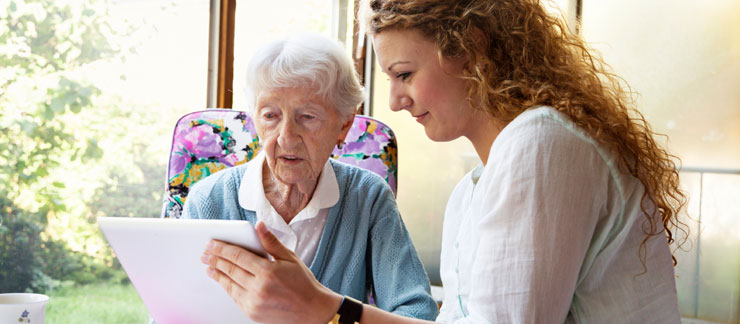
7 Caregiving Hacks Family Caregivers Should Know
The one thing many family members playing the role of caregiver have in common? They’re learning as they go.
Even the most experienced caregiver may find herself facing a new symptom, behavior, worry or another challenge she hasn’t encountered. It’s a role that requires you to think on your feet, which can be intimidating for family members not ready for this amount of responsibility for a parent or loved one. Eventually, the needs of your aging loved one may evolve to the point where it makes sense to retain professional help. However, in the meantime, run with these tips and tactics to simplify your oversight of your loved one.
Create a Caregiver “Command Center”
The caregiver is the keeper of all the information: doctor and salon appointments, meal plans, how Dad likes his eggs, Mom's med list, and more. Devote an area of your home (or wherever care is provided) to managing your loved one’s schedule:
- Use a whiteboard for daily to-dos and personal reminders.
- Hang a large print calendar to track time-sensitive engagements and routine trips to the library or grocery store.
- Get a notebook to jot down what the doctor says and keep a running list of questions and concerns.
- Use an accordion style organizer to keep vital medical and legal records in order — and easily accessible.
Your command center will be extremely valuable when caregiving becomes overwhelming, and when you’re ready to bring in reinforcements.
Fall-Proof the House
Falls are the feared enemy of caregivers and older adults everywhere as they are often the reason more care or supervision is required. Whether it's Parkinson's, macular degeneration or general weakness following surgery, make sure the home is free of any fall hazards. The first step recommended by all veteran caregivers? Ditch the throw rugs.
Then, do a walk-through of your loved one’s home using his cane or walker, and determine where the problem areas are. You may need to hire a contractor or enlist a handy family member to create wider door frames, eliminate raised thresholds or step-downs into rooms or make other accommodations to reduce the risk of falling.
If your loved one should not be using the stairs without support or supervision, lock the door to the basement or outdoor steps (a small, inexpensive alarm for these doors may also be a good investment).
Use a Video Monitor
Caring for someone with Alzheimer's or dementia? Then you're probably concerned about wandering — which is probably keeping you from getting adequate rest. Position a video monitor in a prominent place (many can now be paired with an app that sends alerts to your smartphone) for an extra pair of eyes on your loved one, day or night, in any place of the home when/where wandering occurs.
Change Your Dinnerware
Visual or cognitive impairments, diminishment of fine motor skills or decreased appetite can make mealtimes a task to dread instead of a ritual to enjoy. Empower proper nutrition with different tableware that's easy to see (use high-contrast colors), easy to grab (try curved silverware or a cup with a handle) and easy to maneuver (place items on a non-skid placemat). For a loved one with dementia who tends to be distracted at meal times, go for much smaller portions and separate them on the plate, so they're easy to distinguish.
The Eatwell set — created by a young caregiver whose grandmother lived with Alzheimer’s — is thoughtfully and creatively designed with these dining needs in mind.
Mark the Medications
Medication management is one of the most challenging tasks on a caregiver's plate. From dosage instructions to staying on top of interactions to remembering what bottle is administered on what day or time, it's an overwhelming responsibility — especially as it can have serious health consequences. If you have multiple pill bottles that all look the same, grab a Sharpie and write "M" for Monday, or "D" for
For more advanced sorting and administration help, turn to any number of apps, devices, and medication monitoring tools available to caregivers, like PillPack or MedCoach. Get more information on how a professional caregiver can help manage the medications of your loved one by clicking here.
Automate the Bills
One major advantage of modern banking that’s particularly helpful for caregivers? Automation. Online bill paying through a reputable bank and server is safe and secure. Because you can set it and forget it, that's one less thing for which you have to worry. Certain bills may still require a paper trail process, but for all recurring bills, automatic payments are a great way to streamline an older loved one's need for financial support. Also, as you're spending more time focusing on Mom or Dad's finances, it's not a bad idea for you as the caregiver to "set and forget" your bills, too.
Find Reprieve With Respite
Caring for a parent or senior loved one is an exhausting task. It requires the honing of skills you may not yet have, and family members who unexpectedly become family caregivers for their parent or loved one risk burning out, which carries significant risks for both loved ones and their caregivers.
By creating your command central and streamlining basic daily routines throughout the home as described above, you're also making it easier to bring in additional team members to the house — both family members and professionals. Caregivers often feel alone, and in turn, try to do it alone. But to sustain your strength for the duration of caregiving, expanding the team is one of the most valuable hacks a family caregiver should know.
Looking for more assistance? Click here for 10 must-have caregiver resources.


